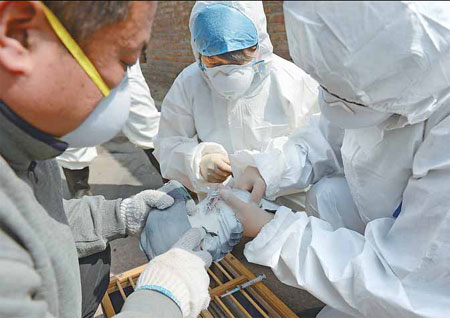4-year-old boy's case suggests virus immunity
Updated: 2013-04-16 07:58
By Xu Wei and Wang Qingyun (China Daily)
|
||||||||
|
Health workers obtain samples from pigeons at a village in Cuigezhuang township, Chaoyang district, Beijing, on Monday. A 4-year-old boy from the village was found to have the H7N9 virus. Hou Yu / China News Service |

A 4-year-old boy in Beijing confirmed as an H7N9 flu virus carrier who has not yet shown symptoms may be an indication that some people are immune to the disease, a health official has said.
The Beijing Municipal Health Bureau said in a statement on Monday that the boy, surnamed Zhu, tested positive for the H7N9 flu virus at the Beijing Center for Disease Control and Prevention. The agency suspected his case might have been caused by chicken that was resold by the family of a 7-year-old girl who became Beijing's first H7N9 case on Saturday.
The boy, who is being monitored at Beijing Ditan Hospital, has not shown any symptoms of the virus, a possible indicator of immunity, said Zhong Dongbo, deputy chief of the municipal health bureau.
"If we can find a large number of carriers of the virus who show no symptoms, that means an immunity barrier could exist among human beings and the virus could disappear eventually," Zhong told a news conference.
Because many cases of infection in East China have been severe, the diagnosis of the boy who has shown no symptoms indicates that the H7N9 virus can also lead to mild or even no symptoms. Confirmation of the boy as a virus carrier also further corroborated the source of the infection as poultry, he said.
Local health authorities traced the boy's case to the village he lives in. The father of the first person infected in Beijing, the 7-year-old girl, sold poultry to villagers. Authorities took throat swabs from 24 people with a high risk of getting the virus, and the city's CDC found the virus in the boy's specimen.
A family that lives across the street from the boy's house bought chicken from the father of the 7-year-old girl, but health authorities failed to find the cause of the 4-year-old's infection because the chicken had already been eaten, he added.
Despite the health bureau's report, Jiang Rongmeng, chief physician at the Infection Center of Ditan Hospital, believes it is premature to call the boy a virus carrier.
"When people infected have a strong immunity, they will naturally recover. The other possibility is an apparent infection like hepatitis B," he said. "We need to further observe this flu virus to see how it will develop inside humans."
The boy's case was discovered as disease control and prevention authorities in Chaoyang district stepped up efforts to monitor a group of high risk from the H7N9 virus, which is mainly poultry industry workers.
As in the girl's case, the parents of the boy trade poultry in Naidong village, Cuigezhuang township in Chaoyang district.
The boy's parents and his elder sister are also under medical observation at hospitals, and the other people who were given tests were under watch in the village.
Village in shock
The discovery of an H7N9 case has shocked Naidong village, as authorities stepped up disinfections and checks for poultry products.
A village official named Zhang estimated that more than 2,000 migrant workers are living in rented houses in the village, in addition to the 400 households.
At the village's entrance, security guards were inspecting all vehicles and pedestrians in and out of the village on Monday afternoon for poultry products. Inside the gatehouse were dozens of bags of refrigerated chicken that had been confiscated from villagers.
The Zhu family's house was a focal point for disinfection crews on Monday afternoon, with workers loading all possible infected items, including the chicken coops, into a garbage truck to take them to be treated.
Zhai Shude, one of the cleaning workers, said they work eight hours a day nonstop to spray disinfectant along the streets.
The village committee broadcast over loudspeakers that villagers should report to authorities any cases of fever. Poultry products, including pickled and pot-stewed duck and chicken, have been banned from the market.
Zhu's father, who is from Henan province, has been selling fresh chicken and fish in the village for more than 10 years and has a good reputation, said Wu Xuqing, a 36-year-old housewife who lives only 50 meters from the family.
Wu said she was shocked to hear the boy has been infected as he was still playing on the streets on Sunday afternoon, hours before he was taken away by doctors from the health bureau.
Despite the case of infection, the normal life of villagers remained undisturbed.
"It would be too much of a burden to keep thinking of the virus. I may avoid walking near the area where they live and may clean the house more often. That's it," said Xie Ming, a 62-year-old in the village.
Contact the writer at xuwei@chinadaily.com.cn
(China Daily 04/16/2013 page3)

 In Photos: 7.0-magnitude quake hits Sichuan
In Photos: 7.0-magnitude quake hits Sichuan
 Li Na on Time cover, makes influential 100 list
Li Na on Time cover, makes influential 100 list
 FBI releases photos of 2 Boston bombings suspects
FBI releases photos of 2 Boston bombings suspects
 World's wackiest hairstyles
World's wackiest hairstyles
 Sandstorms strike Northwest China
Sandstorms strike Northwest China
 Never-seen photos of Madonna on display
Never-seen photos of Madonna on display
 H7N9 outbreak linked to waterfowl migration
H7N9 outbreak linked to waterfowl migration
 Dozens feared dead in Texas plant blast
Dozens feared dead in Texas plant blast
Most Viewed
Editor's Picks

|

|

|

|

|

|
Today's Top News
Live report: 7.0-magnitude quake hits Sichuan, heavy casualties feared
Boston suspect cornered on boat
Cross-talk artist helps to spread the word
'Green' awareness levels drop in Beijing
Palace Museum spruces up
First couple on Time's list of most influential
H7N9 flu transmission studied
Trading channels 'need to broaden'
US Weekly

|

|








